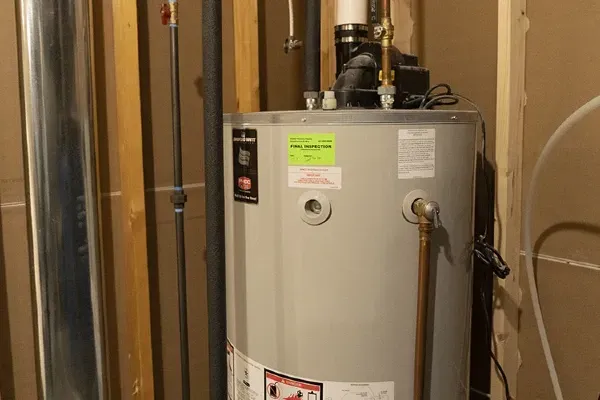
💧 Is Your Water Heater Tank Leaking? Here's What to Do
A small leak can lead to a big flood — here's how to spot water heater problems early and what steps to take.

A leaking water heater tank isn’t just an inconvenience — it’s a warning sign. If you’ve noticed water pooling around your unit or rust forming near the base, it could mean anything from condensation to full tank failure. In this guide, we’ll walk Cambridge homeowners through the possible causes, what you can do immediately, and when it’s time to call a professional.
Common Signs Your Water Heater Is Leaking:
- Pooling water around the base
- Rusty or discoloured water from hot taps
- Dripping or moisture under the tank
- Hissing or sizzling sounds
- Drop in hot water temperature or supply
If you're noticing any of these symptoms, don’t wait — early action can prevent serious water damage.
Where Is It Leaking From?
1. The Cold or Hot Water Inlet/Outlet Connections
Loose fittings or corrosion can cause small, manageable leaks.
2. The Temperature & Pressure Relief Valve (T&P Valve)
This valve is meant to release pressure, but if it's constantly dripping, there may be excess pressure or a faulty valve.
3. The Drain Valve
Used for flushing the tank, this valve can wear out over time and start leaking.
4. The Tank Itself
If the inner tank has corroded, it's not repairable — you’ll need a full replacement.
Causes of a Leaking Water Heater:
- Age of the unit – Most last 8–12 years
- Hard water scaling – Causes internal corrosion and sediment buildup
- High water pressure – Can put strain on valves and joints
- Lack of maintenance – Flushing the tank annually helps extend its life
What to Do First:
- Turn Off the Power Supply
- Gas: Shut off the gas line to the unit.
- Electric: Flip the breaker for your water heater.
- Shut Off the Water Supply
- Locate the shutoff valve on the cold water line above the tank.
- If it’s not working, use your home’s main shutoff.
- Drain the Tank (if needed)
- Attach a hose to the drain valve and lead it to a floor drain or outside.
- Be careful — the water may be hot.
- Call a Professional
- Especially if the tank is leaking from the base or showing signs of corrosion.
Should You Repair or Replace?
- Minor valve leaks? Often repairable.
- Tank corrosion? Time for a new unit.
- Over 10 years old? Replacement is usually more cost-effective.
Choosing a New Water Heater
If you’re due for a replacement, consider:
- Tank vs. tankless models
- Energy efficiency ratings
- Size (based on your household needs)
- Warranty coverage
Modern models offer better energy use and performance, which can save money long-term.
Prevent Future Leaks
- Annual flushing of your tank
- Check the anode rod every few years
- Install a water softener if you have hard water
- Add a leak detection sensor for early alerts
📍 Cambridge Plumbing Help
Leaking water heaters are one of the most common plumbing emergencies we handle in Cambridge homes. If you notice signs of a leak or hear odd noises from your tank, don’t ignore it — call a licensed plumber to inspect and resolve the issue before it turns into a flood.
